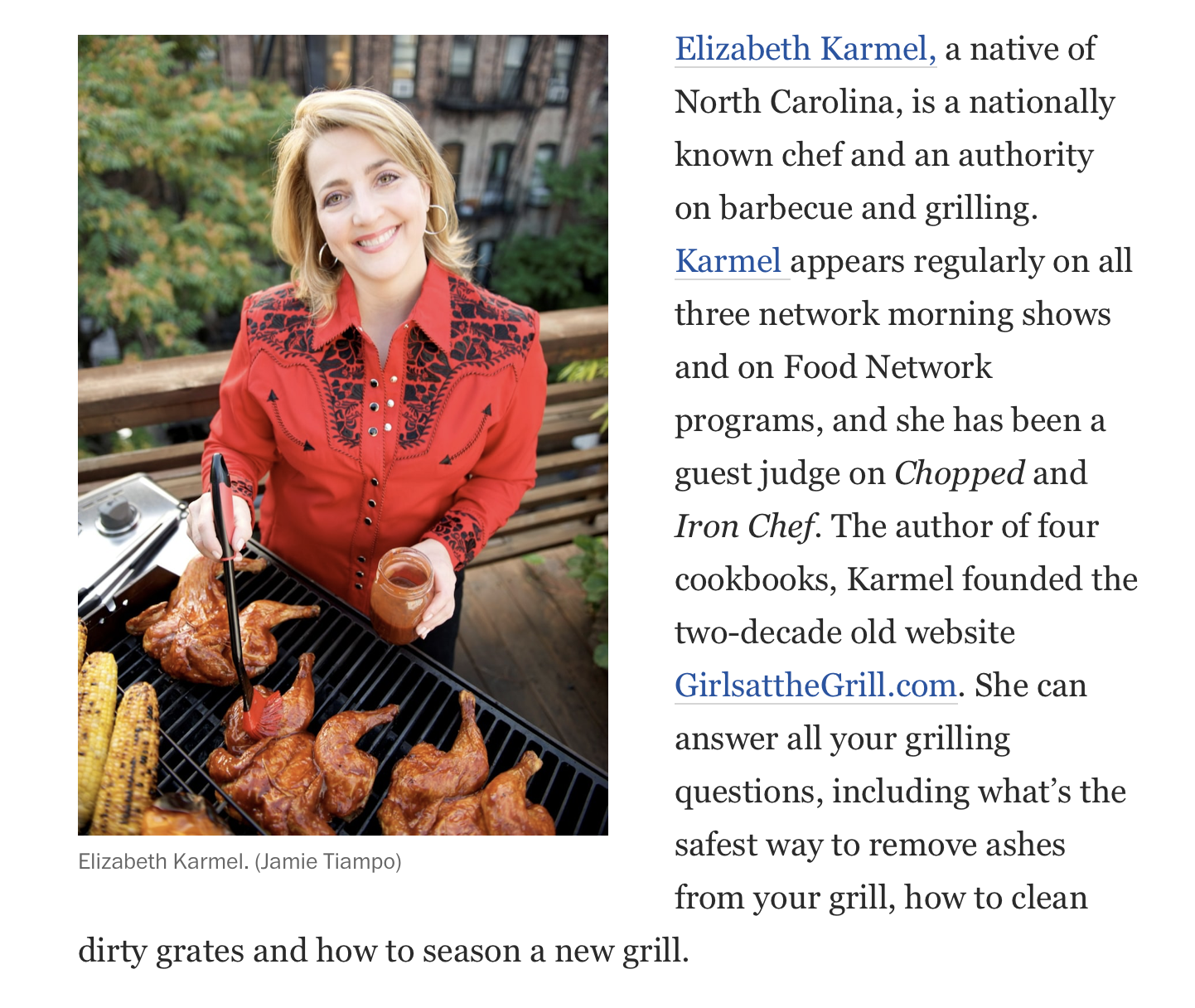Ask the Experts
Q: What’s the difference between a gas grill and a charcoal grill?
“Traditionally, the benefits of gas versus charcoal are simple,” says Karmel. “Gas is easy to light, easy to control the temperature, and you don’t have to refill the fuel as often.” Charcoal requires manual ignition with charcoal briquettes, typically, which can be finicky and messy to use and clean up. A propane grill can be used dozens of times before refueling, while bags of charcoal briquettes or lumps can be used once or twice, depending on the size of the grill and length of use.
Q: How many burners do I need on a gas BBQ?
Karmel says a good grill is less about the number of burners and more about the heating method. “The most important thing about a gas grill is to make sure that you can cook food using both direct heat and indirect heat. If the manufacturer has designed the grill to accommodate both cooking methods then the number of burners is less important.”
To grill with direct heat, you’ll simply place the food on preheated grates, then adjust the burners to the needed temperature and close the lid. Grilling with indirect heat means the food won’t make contact with a flame—on a four- or three-burner grill, you could preheat the grill using the two outside burners and place the food over the unlit middle burner(s). On a two-burner grill, you can preheat the grill with a single burner and cook on the other side.
Q: Can I smoke meat on my gas grill?
In short, yes. As Karmel says, “You can absolutely smoke meat on a gas grill. Many gas grills come with a smoker box attachment, but you can also make one yourself and smoke foods very effectively—all you need are wood chips that you’ve soaked so that they’ll smolder instead of catching on fire.”
Q: How long do gas grills last on average?
“A good gas grill should last you about 20 years,” Karmel says. “After 20 years, you probably want a new grill because grills get better every year, and if you’re an avid griller you will want those new features.”
(NEXSTAR) – Elizabeth Karmel is always ready to debunk “the biggest myth” in grilling.
Karmel, the award-winning chef and cookbook author known as “Grill Girl,” has been grilling and barbecuing for more than 25 years, having shared her tips, tricks and expertise during television appearances on Food Network and in cooking columns for Bon Appetit, Better Homes & Gardens and the Associated Press.
In other words, she’s a veritable grilling guru. But there’s one common grilling practice that she can’t get behind, and unfortunately “a lot of chefs and writers tell people to do it,” Karmel says.
ADVERTISING
That practice? “Oiling the cooking grates instead of oiling the food,” Karmel laments. “This is a rampant grilling mistake that lots of people make. But I’ll tell you why it doesn’t make sense and why it doesn’t work.”
Karmel isn’t exaggerating when she says there are “a lot” of chefs recommending this practice. The internet is brimming with tutorials — from both amateur cooks and professionals — that insist on lightly oiling the grill before placing veggies or meats over the grates. Karmel, however, couldn’t disagree more.
“I can’t tell you how many home cooks have come up to me and explained all their grilling traumas to me, and all I have to say is, ‘Are you oiling the grates?’ I’ll see them again and they’ll say, ‘Oh my god, you’ve changed my whole life.’
Karmel says that oiling the food before grilling will eliminate “60% of your problems.”
“That is the biggest myth I want to debunk, always.”
Karmel insists there are a number of reasons to oil the food instead of the grates, not the least of which is a juicier, better-cooked product.
“If you don’t oil your food, all the juices and moisture in the foods you’ve cooked slowly evaporates out,” Karmel says.
For those who might be skeptical, Karmel offers up the following experiment: Take two slices of eggplant, one oiled and one not, and season both. (“The salt won’t even stick” to the non-oiled one, she notes.) Place the oiled slice directly on the grill, and place the non-oiled pieces over an oiled section of the grates.
“The slice you didn’t oil is going to slowly dehydrate. … It’ll be like a piece of cardboard,” she says. “The other one, you’re going to see all the juices in that cross-section of the eggplant, you’re going to see them steaming and bubbling underneath the surface, and the outside is caramelizing.”
In addition to juicier, more caramelized food, Karmel says that leaving the grates un-oiled will result in fewer headaches later on.
“Oil burns very quickly, and it’s sticky when it burns,” she says. “So if you oil the grates and not the food, you’re effectively gluing your food to the grill,” making for a messy — and possibly burnt — meal.
“If you oil the food, it keeps all of the juices inside the food, it promotes caramelization, and it also helps to prevent sticking. So it’s win-win,” she says.
“BOOKLIST ADVANCE REVIEWS – MAY 1 ISSUE
Steak and Cake: More Than 100 Recipes to Make Any Meal a Smash Hit. (starred review)
By Elizabeth Karmel
May 2019. 272p. Workman, paper, $22.95 (9780761185741). 641.6
Everyone knows how to cook a steak, and the best cakes come from a bakery box, right? Karmel (BBQ&A, 2014) proves these assumptions more than wrong with these 100-plus recipes pairing, you guessed it, steak and cake. Throughout, she shares her expertise and knowledge of the culinary world, whether that means lessons from chefs like Jean-Georges Vongerichten and David Lebovitz or a deep veined précis., and covers everything from cuts of meat to slick baking techniques. Dieters, step aside: every dish is decadent; every match of meat and sweet, delicious. Try beef tenderloin kebabs and Palooza cake walk, or cumin-rubbed flank steak and Tex-Mex chocolate sheet cake, for starters. She adds even more variety with accompanying variations after the initial duet has been presented, and includes more than a few secrets of the art, such as why steak knives matter and “I don’t think seasoning on the steak adds anything except visual appeal.” Anticipate other forthright opinions and a pretty serious photographic glossary of steaks, each with names, muscle group, flavor intensity, texture, defining characteristics, prep notes, and approximate prices by dollar signs. Includes conversion tables.”







































